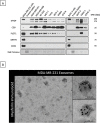Myoferlin is a novel exosomal protein and functional regulator of cancer-derived exosomes
- PMID: 27845903
- PMCID: PMC5347796
- DOI: 10.18632/oncotarget.13276
Myoferlin is a novel exosomal protein and functional regulator of cancer-derived exosomes
Abstract
Exosomes are communication mediators participating in the intercellular exchange of proteins, metabolites and nucleic acids. Recent studies have demonstrated that exosomes are characterized by a unique proteomic composition that is distinct from the cellular one. The mechanisms responsible for determining the proteome content of the exosomes remain however obscure. In the current study we employ ultrastructural approach to validate a novel exosomal protein myoferlin. This is a multiple C2-domain containing protein, known for its conserved physiological function in endocytosis and vesicle fusion biology. Emerging studies demonstrate that myoferlin is frequently overexpressed in cancer, where it promotes cancer cell migration and invasion. Our data expand these findings by showing that myoferlin is a general component of cancer cell derived exosomes from different breast and pancreatic cancer cell lines. Using proteomic analysis, we demonstrate for the first time that myoferlin depletion in cancer cells leads to a significantly modulated exosomal protein load. Such myoferlin-depleted exosomes were also functionally deficient as shown by their reduced capacity to transfer nucleic acids to human endothelial cells (HUVEC). Beyond this, myoferlin-depleted cancer exosomes also had a significantly reduced ability to induce migration and proliferation of HUVEC. The present study highlights myoferlin as a new functional player in exosome biology, calling for novel strategies to target this emerging oncogene in human cancer.
Keywords: angiogenesis; endothelial cells; proteomics; vesicle trafficking.
Conflict of interest statement
Authors declare no conflicts of interest.
Figures





Similar articles
-
Myoferlin regulates cellular lipid metabolism and promotes metastases in triple-negative breast cancer.Oncogene. 2017 Apr;36(15):2116-2130. doi: 10.1038/onc.2016.369. Epub 2016 Oct 24. Oncogene. 2017. PMID: 27775075
-
Myoferlin is a key regulator of EGFR activity in breast cancer.Cancer Res. 2013 Sep 1;73(17):5438-48. doi: 10.1158/0008-5472.CAN-13-1142. Epub 2013 Jul 17. Cancer Res. 2013. PMID: 23864327
-
PINCH-1 interacts with myoferlin to promote breast cancer progression and metastasis.Oncogene. 2020 Mar;39(10):2069-2087. doi: 10.1038/s41388-019-1135-5. Epub 2019 Dec 4. Oncogene. 2020. PMID: 31801973
-
Myoferlin, a multifunctional protein in normal cells, has novel and key roles in various cancers.J Cell Mol Med. 2019 Nov;23(11):7180-7189. doi: 10.1111/jcmm.14648. Epub 2019 Sep 1. J Cell Mol Med. 2019. PMID: 31475450 Free PMC article. Review.
-
Ferlin Overview: From Membrane to Cancer Biology.Cells. 2019 Aug 22;8(9):954. doi: 10.3390/cells8090954. Cells. 2019. PMID: 31443490 Free PMC article. Review.
Cited by
-
Tumor-derived systems as novel biomedical tools-turning the enemy into an ally.Biomater Res. 2023 Nov 9;27(1):113. doi: 10.1186/s40824-023-00445-z. Biomater Res. 2023. PMID: 37946275 Free PMC article. Review.
-
Extracellular Vesicles (EVs) and Pancreatic Cancer: From the Role of EVs to the Interference with EV-Mediated Reciprocal Communication.Biomedicines. 2020 Aug 3;8(8):267. doi: 10.3390/biomedicines8080267. Biomedicines. 2020. PMID: 32756339 Free PMC article. Review.
-
New thoughts and findings on invasion and metastasis of pancreatic ductal adenocarcinoma (PDAC) from comparative proteomics: multi-target therapy.Clin Transl Oncol. 2023 Jul;25(7):1991-1998. doi: 10.1007/s12094-023-03106-8. Epub 2023 Feb 6. Clin Transl Oncol. 2023. PMID: 36745340 Review.
-
A Role of Tumor-Released Exosomes in Paracrine Dissemination and Metastasis.Int J Mol Sci. 2018 Dec 10;19(12):3968. doi: 10.3390/ijms19123968. Int J Mol Sci. 2018. PMID: 30544664 Free PMC article. Review.
-
Surface molecules of extracellular vesicles secreted by the helminth pathogen Fasciola hepatica direct their internalisation by host cells.PLoS Negl Trop Dis. 2019 Jan 18;13(1):e0007087. doi: 10.1371/journal.pntd.0007087. eCollection 2019 Jan. PLoS Negl Trop Dis. 2019. PMID: 30657764 Free PMC article.
References
-
- Thery C, Zitvogel L, Amigorena S. Exosomes: composition, biogenesis and function. Nature reviews Immunology. 2002;2:569–579. - PubMed
-
- Webber J, Yeung V, Clayton A. Extracellular vesicles as modulators of the cancer microenvironment. Seminars in cell & developmental biology. 2015;40:27–34. - PubMed
-
- Webber J, Steadman R, Mason MD, Tabi Z, Clayton A. Cancer exosomes trigger fibroblast to myofibroblast differentiation. Cancer research. 2010;70:9621–9630. - PubMed
-
- Luga V, Wrana JL. Tumor-stroma interaction: Revealing fibroblast-secreted exosomes as potent regulators of Wnt-planar cell polarity signaling in cancer metastasis. Cancer research. 2013;73:6843–6847. - PubMed
MeSH terms
Substances
LinkOut - more resources
Full Text Sources
Other Literature Sources
Medical
Miscellaneous

